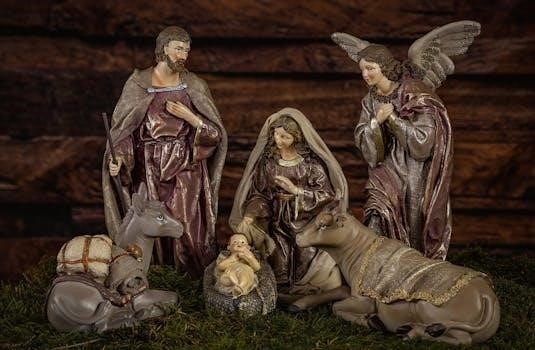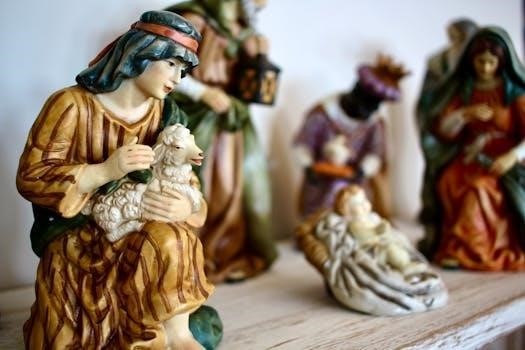Joseph’s Early Life and Favoritism
Joseph, son of Jacob and Rachel, lived in Canaan with his family. He was Jacob’s eleventh son and Rachel’s firstborn, favored for his good character. This favoritism would greatly influence his life’s events.
Joseph’s Birth and Family
Joseph was born to Jacob and Rachel, making him the eleventh of Jacob’s twelve sons. He had one full brother, Benjamin, and ten half-brothers, all sons of Jacob through his other wives, Leah, Bilhah, and Zilpah. This large family lived in the land of Canaan, where Jacob tended his flocks. Joseph, being the firstborn of Jacob’s favored wife Rachel, held a unique position in the family dynamic. The complexities of his family relationships, especially his position as a son of a favored wife, would later contribute to the intense jealousy and resentment he faced from his half-brothers. His lineage also established him as an important figure in the broader narrative of the Israelite people.
Jacob’s Favoritism Towards Joseph
Jacob’s deep affection for Rachel extended to Joseph, her firstborn son, making him a favorite among his children. This preference was evident in Jacob’s actions, which were often perceived as biased by the other brothers. Joseph’s good character further endeared him to Jacob, setting him apart from his siblings. This favoritism, while rooted in parental love, created a rift within the family. Jacob’s preferential treatment, whether in the form of gifts or special attention, fueled jealousy and resentment among Joseph’s brothers. This differential treatment became a key factor in the unfolding events, ultimately leading to Joseph’s betrayal and sale into slavery. Jacob’s actions, while perhaps well-intentioned, had significant and negative consequences on his family.
The Coat of Many Colors
Jacob’s profound favoritism towards Joseph was visibly demonstrated by the gift of a special coat, often described as a “coat of many colors.” This extravagant garment, unlike the simple tunics worn by his brothers, symbolized Joseph’s elevated status and special place in Jacob’s heart. The coat became a clear sign of Jacob’s preference, further exacerbating the existing tensions between Joseph and his siblings. This tangible expression of favor deepened the brothers’ resentment and jealousy, as they perceived it as an indication of Joseph’s perceived superiority and potential inheritance advantages. The coat, therefore, wasn’t just a piece of clothing; it was a potent symbol of division and the catalyst for the brothers’ mounting hatred towards Joseph, ultimately leading to their cruel actions.

Joseph’s Dreams and Brothers’ Jealousy
Joseph’s prophetic dreams, foretelling his future dominance, fueled his brothers’ jealousy; Their hatred grew, leading to a plot against him, showcasing the destructive power of envy.
Joseph’s Prophetic Dreams
Joseph experienced vivid and significant dreams, which he innocently shared with his family. These dreams, seemingly simple, held profound prophetic meaning. In one dream, his brothers’ sheaves of wheat bowed down to his, symbolizing his future authority over them. Another dream depicted the sun, moon, and eleven stars bowing before him, representing his entire family’s eventual submission. These visions, though unclear to Joseph at the time, ignited jealousy and resentment within his brothers, as they perceived them as arrogant claims of superiority. Joseph’s naive recounting of these dreams served as a catalyst for the turmoil that would soon engulf his life, highlighting the power of prophetic revelation and the destructive nature of envy within the family dynamic.
The Brothers’ Hatred and Plot
Fueled by intense jealousy and resentment over Joseph’s favored status and his prophetic dreams, Joseph’s brothers harbored deep animosity towards him. They perceived his dreams as arrogant and ambitious, further intensifying their hatred. Their ill feelings were not only rooted in envy but also in the fact that Joseph brought bad reports of them to their father, Jacob. This simmering resentment eventually boiled over into a sinister plot. Unable to control their rage, the brothers conspired to get rid of Joseph; Initially, their intent was to kill him, but Reuben intervened, suggesting they throw him into a pit instead. This change of plan was not out of kindness, but to delay the murder. They ultimately sought to silence Joseph and eliminate the perceived threat to their own standing within the family.
Joseph’s Betrayal and Sale into Slavery
After throwing Joseph into a pit, his brothers, hardened by their animosity, saw an opportunity for profit. Spotting a caravan of Ishmaelite traders passing by, they decided to sell Joseph into slavery. This act of betrayal was a calculated move, born out of their hatred and desire to rid themselves of him permanently. They callously sold their own brother for twenty pieces of silver, a sum that underscored their lack of compassion. This transaction marked a turning point in Joseph’s life, severing him from his family and homeland. Unbeknownst to them, this heinous act would set in motion a series of events that would ultimately lead to their own salvation, as well as a significant part of God’s divine plan. Joseph’s life had changed drastically because of his brothers’ actions.

Joseph in Egypt
Sold into slavery, Joseph was brought to Egypt. He first served Potiphar, then was unjustly imprisoned. Despite hardships, God was with him, granting success and favor.
Joseph’s Time with Potiphar
Upon arriving in Egypt as a slave, Joseph was purchased by Potiphar, an officer of Pharaoh and captain of the guard. The Lord was with Joseph, and he became a successful man in Potiphar’s household. Joseph’s master recognized that the Lord was with him and that everything Joseph did prospered. Due to his diligence and God’s blessing, Joseph quickly gained Potiphar’s trust. He was put in charge of Potiphar’s entire household and all his possessions. Joseph’s management was exemplary, and his presence brought prosperity. Potiphar entrusted everything to Joseph. It was during this time that Joseph demonstrated exceptional skills and integrity, showing his faith even in servitude. However, his faithfulness would soon be tested by false accusations that would lead him to an even darker place.
Joseph’s Imprisonment
Despite his success in Potiphar’s house, Joseph faced a severe trial. Falsely accused by Potiphar’s wife, he was unjustly thrown into prison. The place of confinement was likely a dungeon, a harsh contrast to his previous position. Yet, even in this dark place, the Lord remained with Joseph. He found favor with the prison warden, who recognized his integrity and competence. The warden placed Joseph in charge of the other prisoners, giving him responsibilities akin to his role in Potiphar’s house. Joseph’s diligent and trustworthy nature allowed him to manage the prison affairs effectively. His time in prison, while difficult, allowed him to learn and grow. This also set the stage for his future encounters with fellow inmates who would play roles in his destiny.
Joseph’s Ability to Interpret Dreams
While imprisoned, Joseph’s unique gift for interpreting dreams became evident. Two of Pharaoh’s officials, a cupbearer and a baker, were also imprisoned. Both had disturbing dreams, and Joseph, through divine assistance, was able to accurately decipher their meanings. He explained that the cupbearer would be restored to his position, while the baker would face execution. These interpretations came to pass exactly as Joseph had foretold, further establishing his reputation as a reliable dream interpreter. Joseph humbly acknowledged that this ability came from God, not from himself. This gift would prove to be crucial in his future, ultimately leading to his rise to power in Egypt. His success in interpreting dreams showed God’s favor.

Joseph’s Rise to Power and Reconciliation
Joseph’s ability to interpret dreams led him to Pharaoh, where he interpreted the king’s dream. This resulted in his rise to power and eventual reunion with his family.
Joseph Interprets Pharaoh’s Dream
Imprisoned unjustly, Joseph’s life took a dramatic turn when he was summoned to interpret Pharaoh’s perplexing dreams. The dreams, featuring seven healthy cows and seven sickly ones, along with seven full ears of grain and seven withered ones, troubled the Egyptian ruler. Joseph, with divine insight, revealed that the dreams foretold seven years of abundance followed by seven years of severe famine. He advised Pharaoh to prepare for the famine by storing up surplus grain during the prosperous years. This accurate interpretation demonstrated Joseph’s unique gift and wisdom and demonstrated God’s plan.
Joseph Becomes Governor of Egypt
Impressed by Joseph’s wisdom and divine insight, Pharaoh elevated him to a position of immense power. Joseph was appointed governor of all of Egypt, tasked with overseeing the collection and storage of grain in preparation for the predicted famine. He was given the name Zaphenath-Paneah and married Asenath. Joseph’s rapid ascent from prisoner to governor demonstrated his exceptional leadership skills and unwavering faith. He diligently managed Egypt’s resources, ensuring the nation’s survival during the challenging years to come. He demonstrated persistence and faithfulness in all tasks, earning Pharaoh’s trust.
Joseph’s Reunion and Forgiveness of His Brothers
During the famine, Joseph’s brothers traveled to Egypt seeking food, unknowingly standing before their long-lost brother. Joseph, now a powerful governor, recognized them but initially concealed his identity. He tested them, observing their remorse and changed character. Ultimately, Joseph revealed himself, leading to an emotional reunion. He embraced his brothers, offering complete forgiveness for their past betrayal. Joseph acknowledged God’s hand in his suffering, understanding it was a part of a larger plan for good, saving their family from the famine. This act of forgiveness showcased Joseph’s deep faith and compassionate spirit.

Themes and Legacy
Joseph’s story highlights forgiveness, redemption, and God’s providence. It teaches valuable lessons about facing adversity, overcoming challenges, and the importance of faith in difficult times, leaving a lasting legacy.
Themes of Forgiveness and Redemption
The narrative of Joseph powerfully illustrates the profound themes of forgiveness and redemption. Joseph, despite facing betrayal and hardship at the hands of his brothers, ultimately chooses to forgive them. His ability to let go of bitterness and resentment showcases the transformative power of forgiveness. Joseph’s journey from slavery to a position of power in Egypt also exemplifies redemption, highlighting how God can use even the most challenging circumstances for good. This theme resonates deeply, encouraging us to seek reconciliation and find hope even in the midst of suffering. It underscores the belief that forgiveness is not merely an act of tolerance but a path to healing and restoration, both for ourselves and others. Joseph’s story emphasizes God’s ability to bring about good from evil and that redemption is always possible.
Joseph’s Role in God’s Plan
Joseph’s life story is a powerful testament to God’s sovereignty and His ability to use individuals to fulfill His divine plan. Despite facing numerous hardships, such as being sold into slavery and imprisoned unjustly, Joseph’s experiences were ultimately part of a larger purpose. God orchestrated his circumstances to bring about the preservation of his family during a severe famine. Joseph’s rise to power in Egypt allowed him to provide for his own family and countless others. His journey demonstrates that even in moments of suffering, God is working behind the scenes to achieve His purposes. Joseph’s story highlights that human actions are ultimately under God’s control, and He can use even negative events to bring about good. Joseph’s role was pivotal in the history of the Israelites.
Lessons from Joseph’s Story
Joseph’s narrative offers many important lessons applicable to our lives today. It emphasizes the importance of maintaining faith and trust in God, even amidst trials and tribulations. Joseph’s unwavering faith sustained him through slavery, imprisonment, and betrayal, ultimately leading to his success. The story also teaches about the destructive nature of jealousy and hatred, as seen in the actions of Joseph’s brothers. Furthermore, it highlights the significance of forgiveness and reconciliation, exemplified by Joseph’s eventual pardon of his brothers. We learn that God can use even the worst situations for our ultimate good, if we remain faithful and choose the path of righteousness. Joseph’s story underscores the power of resilience and the importance of forgiveness in overcoming adversity.
